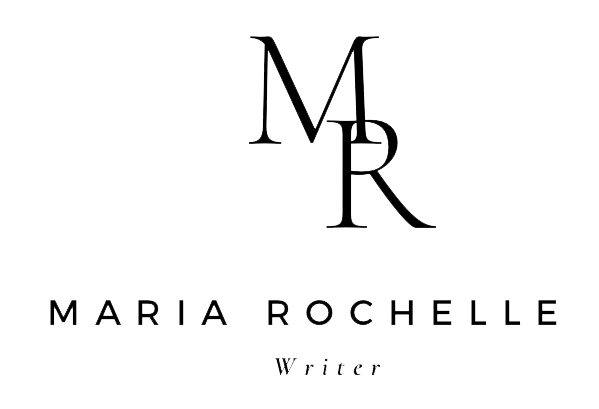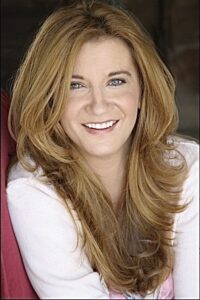
Peggy Lane grew up in Chicago and later moved to Los Angeles. She is an executive creative director, producer, and series director of Donna On the Go which was submitted for 4 Emmy nominatons. She’s a dialgoue coach, producer, director, and actor as well.
She shares with me the struggles and joys of being a diaglogue coach. Working with numerous actors as their dialgoue coach, Peggy shares a story of one of her favorite actors she’s worked with.
Read more about this multi-talented lady who in my opinion is legendary. I hope by reading and learning about what she has accomplished will encourage you in your dreams of whatever sets your heart on fire.
Introducing Peggy…
What do you love about life right now?
That the industry is back to work and shows and films are coming back. I love that I have had more time to do all the things I couldn’t do when I was working. That and my fur kids.
You’ve acted in two of my favorite shows, Will and Grace and Seinfeld, among others. You have over 700 hours of network television experience, which is impressive. Do you have a favorite show you’ve acted on and why?
Will & Grace hands down. After getting to be in Seinfeld for 7 years, I never in my life thought an experience like that would happen again, but it did and it was even better!
I got to work with the legendary Jimmy Burrows on Will & Grace and it was the best acting class in the world. To be directed by him with the same respect he afforded the cast and famous guest stars was mind blowing.
Jimmy has a belief that if a line doesn’t get a laugh, it’s not the actor, it’s the writing. And getting that “Jimmy laugh” is the most amazing feeling in the world.
Besides acting, you’re a producer, writer, screenwriter, singer, bass player and a dialogue coach. You’ve worn many hats in the entertainment industry. Do you have a favorite and why?
It’s a lot of hats, isn’t it? I loved playing music (keyboards, lead guitar and bass) for years professionally in Chicago and out here in Los Angeles, but no one could make a living at it. Once clubs started with karaoke, they were basically saying that any drunk was more entertaining than professional live musicians. The writing was on the wall.
My favorite hat would be directing. I love telling a story through a camera lens and working with actors. As an actor myself, I speak the language so I understand what they need.
Was there anybody in particular who inspired you to act and go into the entertainment industry? From what I’ve read on your website, you’ve been acting professionally since you were 5.
It was my Mom’s idea. I had a weak knee, and the doctor suggested ballet lessons. Another woman there told my Mom she should get me into modeling and so it began.
I booked my first professional photo shoot around the age of 5 and within 5 years got to do some commercials, so the Screen Actors Guild called my mom and ask me to join. I was 10 and didn’t care about joining a union; I wanted a bike! But thankfully, my mom had the foresight to know how important that would be.
What advice would you give to someone who is pursuing acting as a profession?
You HAVE to love it because it’s a hard business to make a living at. So, if you can find joy and a sense of purpose in acting along with finding the empathy for others and if you can’t imagine doing anything else, you owe it to yourself to go for it.
As a dialogue coach, you’ve worked with numerous actors in film and television from Matt Damon, Molly Shannon, Whoopi Goldberg, Sean Hayes, and many others. What does a dialogue coach do exactly?
Usually the job is on set to help the actors with their lines for the scene they are about to film. For single camera shows and films (like Greys Anatomy etc., usually hour long shows) we would rehearse the lines for the scene they are about to do. That can be on the set or in the hair and makeup trailer or both.
For multi cam sitcoms – filmed in front of a live studio audience – we would rehearse and run lines for the entire show. That’s because the show is filmed live with an audience and the actors are basically learning an entire play.
During those shows, the writers will huddle between takes of the scene to add or cut lines, and there is very little time to help the actors learn them. They change moments before they film them.
Sometimes on shows you’re really hired to be an Acting Coach as well, but because of the celebrity of the actors, they will call it a Dialogue Coach.
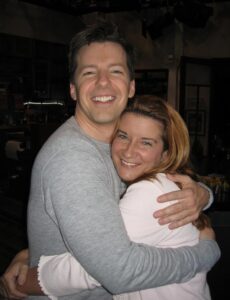
Are there challenges to being a dialogue coach?
Personalities. Some people don’t want to be corrected and some people are open to it. Some people are overwhelmed by the amount of notes or changes. I really like to help calm people down.
In a particular episode of an Emmy-winning sitcom, a completely new script emerged while the audience was being seated. One actor broke down and asked me “what am I going to do?”
I said we take it scene by scene. I checked, and he had no changes in the first scene. In the next scene, he had a wardrobe change, and I followed him and we rehearsed it along the way and also in the hair and makeup room.
What’s so weird is that the studio audience did not know that the cast got a whole new script moments before the filming with many line changes. They are told by the warm up comedians that the cast has been rehearsing all week, and that’s true, but there are typically changes from day to day.
I imagine there are joys to coaching. Share with me a little on those.
I pitched a joke once that made it into the show. Hearing the audience laugh at it was a high I will never forget.
Watching adult actors or child actors get more comfortable and have fun with it is a joy. The entire system isn’t set up to accommodate actors. Often, they have to endure long waits and then rush to the set for work.Other than multi camera shows, scenes are filmed out of script order because of location and cast availability. So we go over where they are in the script and what happened just before this scene. “
Is it possible to have a favorite actor or two you’ve worked with?
Working with Margo Martindale changed my life. She had never done a sitcom when she got The Millers. She wanted to be “opening night ready”. I told her that’s a theatre conceit and no one in a play ever got handed new lines (or a whole script for that matter) moments before filming.
After about 3 episodes, she got the hang of it and had fun with it. The audience actually loves those moments when someone flubs a line or makes a mistake because they are seeing something they would never see at home and getting a brief glimpse into the actor’s personality. For Margo – coming from Dramas – she was concerned about her character’s story line, also called a through line, so if a line was taken out that might have been the line that made it all make sense for her character.
I’m also a writer and after getting to work with Margo, I went through everyone of my scripts with an eye on every characters through line.
I also love working with Molly Shannon. I got to coach her for the HBO series Divorce and she wanted to go over and over it for hours at a time. I went to her house, and she jogged around the block with me next to her so she could see if she had the dialogue “in her body” by doing another task. So it would be second nature. I’ve never seen anyone do that, and I think it’s a really smart idea.
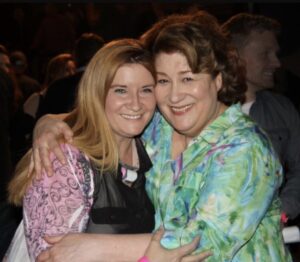
You’ve written some screenplays. Where do you find inspiration to write them? Do you use a particular software?
Final Draft for me and it’s pretty easy to use. Most of the scripts I’ve written are about things that happened to me. Screw is about my days in a rock band and it’s set up somewhat like a soap opera. Screw is the name of the band.
Golden Christmas is about me meeting my birth family at the same age as my birth mother was when she passed
Hello Molly is a script I wrote specifically for Molly Shannon and she read it.
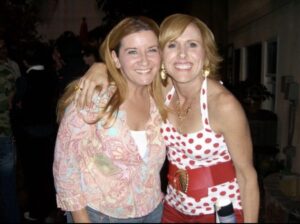
Who has been your biggest supporter throughout your career?
My mother, Dolores “Dee” O’Rourke, was. She’s since passed on, but she always encouraged me.
All of us have had failures in our life. Sometimes, after failure, we have success later. Do you have a favorite failure?
This one has really stumped me. I can’t call any “failure” a favorite, but maybe that’s because I don’t think of it as a failure but rather a redirection. It either wasn’t meant for me, or there’s a new approach to tackle it.
Did you visualize all your success when you were younger? Like, did you set goals to achieve everything you’ve accomplished?
I’m big on setting goals. I set so many of them I disappoint myself if I only got one and finally realized that I’m not celebrating my accomplishments that way, so I’m being more realistic.
I set goals to get work and then when I was there to move up. Set the goal, make the effort, and do your best. Sometimes it happens and sometimes it doesn’t. If it doesn’t, it wasn’t meant to be.
Was acting, among other things you do, dreams come true for you?
Yes, one of many. I realized one of my biggest dreams by submitting the show I created, Donna On The Go, for Emmy consideration. I wrote, produced and directed it and it was submitted for Best Director Comedy and Best Short Form Series. That was a dream come true.
What are you currently working on?
These 20 questions! No, seriously, a speech I’m writing for an award I’m getting in Feb. It’s a Lifetime Achievement Award, so it has to be a wonderful speech.
As with most actors, we work to get work, so for now I’m not on a show yet. I’ve been coaching actors and incredibly busy with Union Service. It’s all volunteer time, but it can feel like a full-time job.
Alright, here’s something I love to inquire from everyone that I’ve interviewed. Tell me three fun facts about you.
1. I loved Doris Day movies when I was a kid. I would pretend to be sick so I could stay home and watch them when they were on. This is when you could only watch a show when it actually aired. I stayed up until 4 am once watching Calamity Jane.
2. I was baptized Margaret but for some unknown reason, Peggy is a derived from the name Margaret. I guess it goes Margaret, Maggie, Peggy? It is a British thing, apparently. Proves they drink.
3. My first guitar was a blond Fender Telecaster since I was really young (around 12) and it was the only electric guitar light enough for me to hold. But my dream guitar was a white Les Paul, and I eventually saved enough to get one with my modeling money. I was so proud I sent out “birth” certificates announcing it. I still have it.
Describe yourself in one word.
Driven.
If you could have a gigantic billboard anywhere with anything on it, what message would you want to convey to millions? What would it say and why?
Be kind. Someone else’s success does not take away from yours. Cheer each other on.
Why? – because not enough people do that and it leads to unhappiness. Like a lot of social media where it appears that everyone is having a better time than you when, in fact, they might not be at all. It’s all for show.
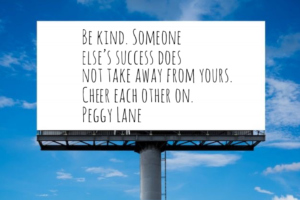
In the last two years, what new belief, behavior or habit has most improved your life?
The pandemic brought so many changes for people and so much loss. I lost my work, my apt and my health care as so many people did. That led to more introspection and the realization that a lot of what I had been doing wasn’t making me happy.
I wasn’t enjoying the show I was on or the people I was working with at the time, so it was “just” a job. A job I knew I was lucky to have, but it had no chance at all for advancement. So, I guess for me it was acceptance, calming down and a time of reflection as to what I really want and enjoy.
I’ve channeled a lot of my ambition into union service. I’ve been a member of SAG AFTRA since I was 10 years old and they were two separate unions.
I’m a member of the Los Angeles Local Board, I Chair 3 Committees and I’m a member of several other Committees, including the Sexual Harassment Prevention Committee. I’ve also been a part of 8 different Negotiating Committees. It’s been both challenging and inspiring to be able to speak directly to the AMPTP (the studios and networks that employ us) and actually accomplish things that haven’t ever been done.
I love ending my chats with quotes. Do you have a favorite quote or a saying that has inspired and encouraged you?
Work harder than anyone else, play fair, and if something you want still doesn’t come your way, it wasn’t meant for you. Rejection can be protection.
Thank you for reading my chat with Peggy!
Follow her on social media and check out her website.
